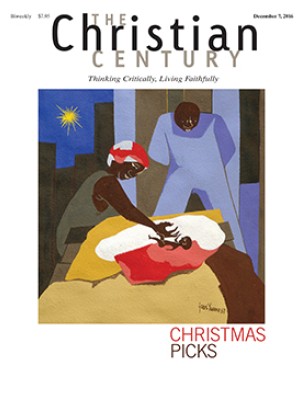Construction of mosque gives Greek Muslims hope of greater religious parity
It’s time for evening prayers. Shah Malik heads to Masjid Usman, in an Athens neighborhood that is home to immigrants from Afghanistan, Pakistan, and Bangladesh.
A handwritten sign taped beside the entrance reads that the prayer space is registered as a library. At least 200,000 Muslims live in Athens, but of the 120 prayer spaces in the city, only three have been able to navigate a maze of legal restrictions to register as mosques.
“You have to hire a bunch of lawyers and inspectors,” said Malik, who came to Greece from Pakistan 14 years ago and serves as the makeshift mosque’s treasurer. “You have to rent a proper space with safety measures, like multiple exits. It’s a shame, but most of us cannot afford to do that.”
Read our latest issue or browse back issues.
By operating as libraries or cultural centers, these mosques lack the legal protections that nonprofit places of worship enjoy. And they could be shut down by authorities.
Greek authorities recently announced that a contract had been awarded for the construction of a state-funded, properly registered mosque—the first since the nation’s independence from the Ottoman Empire nearly 200 years ago. Arab diplomats in Athens have been trying to get permission to build a mosque since the 1970s.
The mosque, expected to cost about $1 million, will have capacity for about 300 worshipers and is being built in a former naval repair yard in the Votanikos neighborhood of Athens, west of downtown.
“We have been hearing about this for decades,” Malik said. “If it happens, if it actually gets constructed, it would be great. It would allow us to feel like we can have an open presence here.”
When Greece gained independence from the Ottoman Empire in 1829, it sparked decades of tensions between ethnic Turks, who were almost all Muslims, and ethnic Greeks, who were almost entirely Greek Orthodox Christians.
Ottoman rulers had built mosques throughout Athens, even converting the Parthenon into one, but these structures were either destroyed or repurposed for uses such as warehouses or army barracks.
The 1923 Treaty of Lausanne granted rights to some 100,000 Muslims in majority ethnically Turkish parts of Greece, such as allowing them to follow Islamic family law and to have nonprofit foundations and cemeteries, a quid pro quo that saw similar rights granted to the Greek Orthodox minority in Turkey.
Those ethnic Turks were the only Muslims in Greece until the 1980s, when immigrants from Egypt, Libya, Pakistan, Afghanistan, and Bangladesh began to stream into the country, hoping to make a fresh start in Europe.
There have been recent waves of Muslim immigrants, too, from Syria and Afghanistan. At least 60,000 are waiting for political asylum decisions in the country. But the Muslim communities are ethnically fractured and lack the funds or organization to register a mosque.
South of downtown at the Arab-Hellenic Center for Culture, the community is better organized than the one at Masjid Usman, partly due to a multi-million-dollar donation from a U.K.-based Islamic foundation that helped the center convert a factory into the mosque in 2007. But today, funds have run out.
“We don’t even have money to pay the electric bill,” said Tariq Jizawi, as he wrapped up Friday prayers, which were attended by about 100 men. “We need maybe 50,000 euros to get this place registered” as a mosque.
Right-wing extremists targeted the center, one of the most visible mosques in the city, in 2014, leaving a pig’s head before the entrance, spraying graffiti, and painting a cross on the door.
For Muslims like Jizawi, who immigrated to Greece from Lebanon in the 1990s, it’s time the Greek government followed the example of other European nations.
“They fund the church,” he said. “They should also give some funds to help mosques here.”
The Greek government has tried to find space for a mosque on five occasions in the last 15 years; each time it was rebuffed by lawsuits and public denunciations. Local bishops have been particularly outspoken. In contrast, Ecumenical Patriarch Bartholomew I of Constantinople, leader of global Orthodox Christians, has repeatedly called for building a mosque in Athens.
Still, the issue of a mosque has become a rallying point for xenophobic groups in the country. Members of Golden Dawn, a now-banned political party, have led several violent protests over the years against the Votanikos district mosque project.
The new state-funded mosque will not meet all of the needs of the large Muslim community in Athens. But, said Malik, it would be “an important step towards making us feel like we belong here.” —Religion News Service






